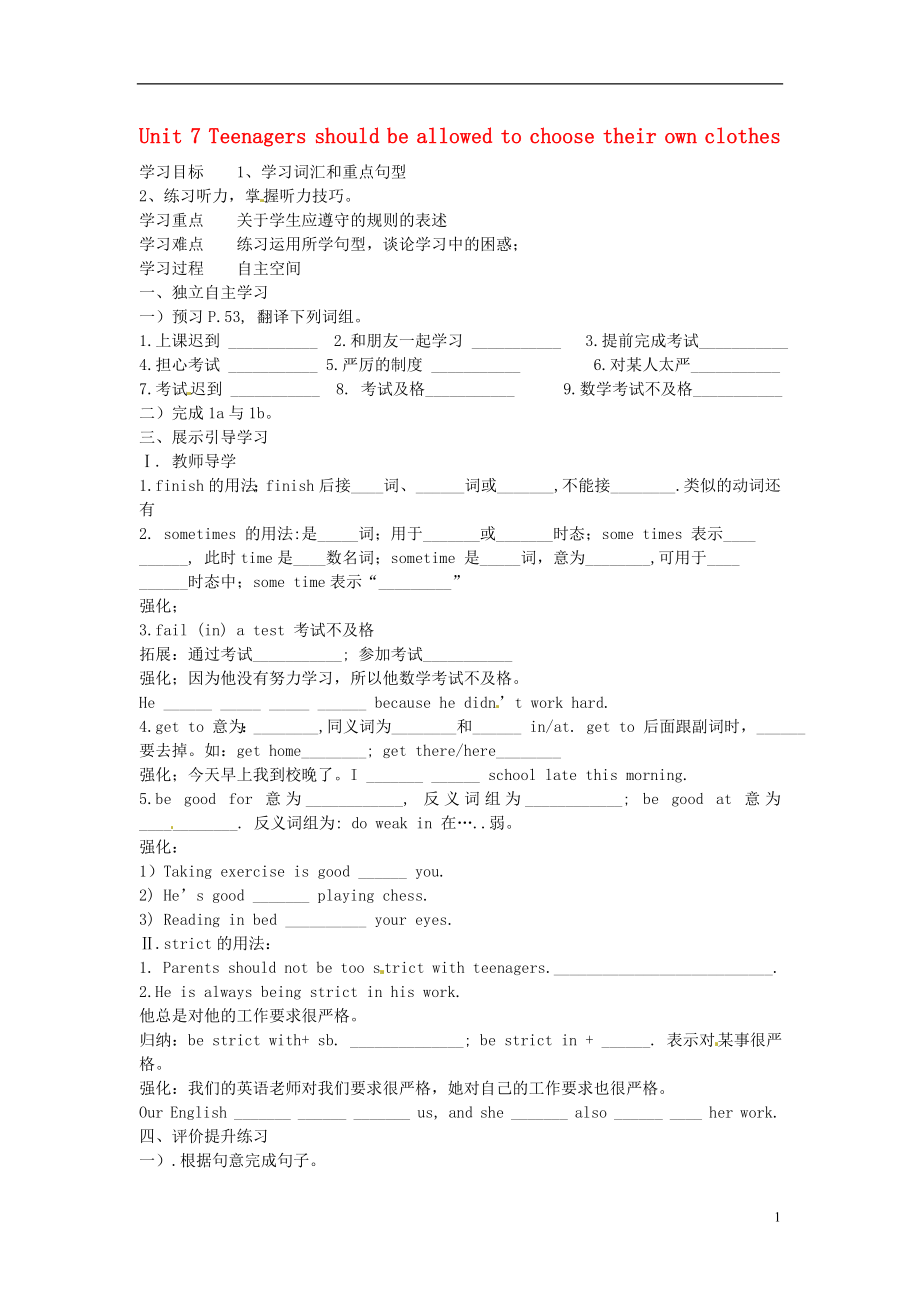《云南省會(huì)澤縣金鐘鎮(zhèn)第三中學(xué)校九年級(jí)英語全冊(cè) Unit 7 Teenagers should be allowed to choose their own clothes Period 4 Section B(1a-1e)導(dǎo)學(xué)案(無答案)(新版)人教新目標(biāo)版》由會(huì)員分享���,可在線閱讀�,更多相關(guān)《云南省會(huì)澤縣金鐘鎮(zhèn)第三中學(xué)校九年級(jí)英語全冊(cè) Unit 7 Teenagers should be allowed to choose their own clothes Period 4 Section B(1a-1e)導(dǎo)學(xué)案(無答案)(新版)人教新目標(biāo)版(2頁珍藏版)》請(qǐng)?jiān)谘b配圖網(wǎng)上搜索����。
1、
Unit 7 Teenagers should be allowed to choose their own clothes
學(xué)習(xí)目標(biāo) 1����、學(xué)習(xí)詞匯和重點(diǎn)句型
2、練習(xí)聽力�����,掌握聽力技巧�。
學(xué)習(xí)重點(diǎn) 關(guān)于學(xué)生應(yīng)遵守的規(guī)則的表述
學(xué)習(xí)難點(diǎn) 練習(xí)運(yùn)用所學(xué)句型,談?wù)搶W(xué)習(xí)中的困惑�;
學(xué)習(xí)過程 自主空間
一����、獨(dú)立自主學(xué)習(xí)
一)預(yù)習(xí)P.53, 翻譯下列詞組��。
1.上課遲到 ___________ 2.和朋友一起學(xué)習(xí) ___________ 3.提前完成考試___________
4.擔(dān)心考試 ___________ 5.嚴(yán)厲的制度 ___________ 6.對(duì)
2���、某人太嚴(yán)___________
7.考試遲到 ___________ 8. 考試及格___________ 9.數(shù)學(xué)考試不及格___________
二)完成1a與1b。
三�����、展示引導(dǎo)學(xué)習(xí)
Ⅰ. 教師導(dǎo)學(xué)
1.finish的用法����;finish后接____詞、______詞或_______,不能接________.類似的動(dòng)詞還有
2. sometimes 的用法:是_____詞�����;用于_______或_______時(shí)態(tài)���;some times 表示____
______, 此時(shí)time是____數(shù)名詞����;sometime 是_____詞,意為________,可用于____
3��、
______時(shí)態(tài)中��;some time表示“_________”
強(qiáng)化�����;
3.fail (in) a test 考試不及格
拓展:通過考試___________; 參加考試___________
強(qiáng)化���;因?yàn)樗麤]有努力學(xué)習(xí)�����,所以他數(shù)學(xué)考試不及格���。
He ______ _____ _____ ______ because he didn’t work hard.
4.get to 意為:________,同義詞為________和______ in/at. get to 后面跟副詞時(shí),______要去掉���。如:get home________; get there/here_____
4����、___
強(qiáng)化�����;今天早上我到校晚了。I _______ ______ school late this morning.
5.be good for 意為____________, 反義詞組為____________; be good at 意為____________. 反義詞組為: do weak in 在…..弱�。
強(qiáng)化:
1)Taking exercise is good ______ you.
2) He’s good _______ playing chess.
3) Reading in bed __________ your eyes.
Ⅱ.strict的用法:
5、
1. Parents should not be too strict with teenagers.___________________________.
2.He is always being strict in his work.
他總是對(duì)他的工作要求很嚴(yán)格���。
歸納:be strict with+ sb. ______________; be strict in + ______. 表示對(duì)某事很嚴(yán)格�。
強(qiáng)化:我們的英語老師對(duì)我們要求很嚴(yán)格��,她對(duì)自己的工作要求也很嚴(yán)格����。
Our English _______ ______ _______ us, and she _____
6�����、__ also ______ ____ her work.
四�、評(píng)價(jià)提升練習(xí)
一).根據(jù)句意完成句子。
1. We all think he will f______ a test because he never works hard.
2. I’m glad that I have p______the exam.
3.We call the persons between 13 and 19 years old t______.
4.As a student, we must be s______ in our study.
5.Don’t w_______, there
7��、is a little time left.
二)根據(jù)漢語完成句子�。(詞數(shù)不限)
1.皮特應(yīng)該被允許以后參加考試。
Peter should be allowed to_____________.
2.學(xué)生們需要嚴(yán)格的規(guī)則�����。
Students need. ___________________.
3.父母不應(yīng)該對(duì)孩子們要求太嚴(yán)格。
Parents should not be_______________________.
4.如果他們甚至連機(jī)會(huì)都不給他是不公平的
It’s not fair if ________________________
5.但是他解釋發(fā)生了什么����,老
8、師會(huì)理解的.
But if he explains_______________, the teacher. _______________
三)單項(xiàng)選擇(中考鏈接)
1.Something is wrong with my MP4.I will get it ______.
A.repair B.repairing C.to repair D.repaired
2.—Sixteen?year?olds should be allowed to drive.
—______.Because they're not serious enough.
A.I agree B.I disagree C.I think so D.I don't think
3.The students ______ play basketball after school every day.
A.a(chǎn)llow B.a(chǎn)llow to C.a(chǎn)re allowed to D.were allowed to
五�����、課堂小結(jié):
1.我的收獲:
2.我的困惑:
2
 云南省會(huì)澤縣金鐘鎮(zhèn)第三中學(xué)校九年級(jí)英語全冊(cè) Unit 7 Teenagers should be allowed to choose their own clothes Period 4 Section B(1a-1e)導(dǎo)學(xué)案(無答案)(新版)人教新目標(biāo)版
云南省會(huì)澤縣金鐘鎮(zhèn)第三中學(xué)校九年級(jí)英語全冊(cè) Unit 7 Teenagers should be allowed to choose their own clothes Period 4 Section B(1a-1e)導(dǎo)學(xué)案(無答案)(新版)人教新目標(biāo)版

